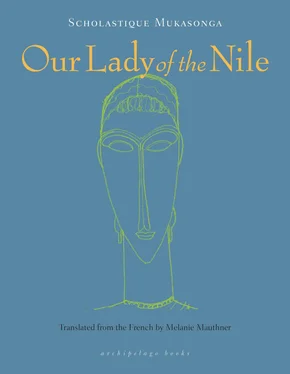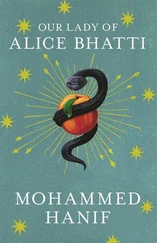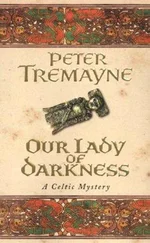That very same day also brought great disappointment. The breathless mayor arrived to inform Mother Superior of the latest instructions the President’s office had just telephoned through. Mother Superior called together the teachers and all the staff to update them on the new arrangements. They would fill the pupils in later. Queen Fabiola’s timetable was overloaded. In addition to the First Lady’s Orphanage, she was to make a donation to the Gatagara Care Center for Handicapped Children and visit the Benebikira Sisters. Of course the lycée of Our Lady of the Nile was still on her schedule, but she could only spend an hour there. She didn’t want to disrupt the pupils’ timetable in any way, but she was intent on dropping in on a lesson for at least a few minutes to encourage the pupils and applaud the government’s efforts to promote female education. They would therefore have to trim the welcome speeches, cut most of Brother Auxile’s songs, and shorten the dances. Instead of convening in the large study room, they would welcome the Queen in the yard, weather permitting, or else in the entrance hall. It was agreed that the Queen would sit in on Sister Lydwine’s geography class — for no more than ten minutes, the mayor instructed. The topic would be agriculture in Rwanda. There’d be a rehearsal in the afternoon, where they’d try to anticipate Fabiola’s possible questions and prepare answers. Just before the sovereign’s departure, the seniors would give her presents, and Brother Auxile’s choir would sing the national anthem and, if time allowed, a few of the songs.
The Belgian professors protested: they had been promised a personal introduction to their Queen and a few minutes’ conversation with her. They were told they could stand in the corridor outside the classrooms, and when Fabiola walked by they’d be able to greet her, and she’d probably address a few words to each teacher. The French teachers said they didn’t feel particularly involved, but they’d gladly take a few photos as souvenirs. The mayor strictly forbade them to do so.
On the following day, the eve of the royal visit, things grew even more frantic. State security agents arrived, flanked by five white men in dark suits, definitely Belgians. They seemed to be in a hurry, walking so fast the mayor struggled to keep up. They had a meeting with Mother Superior in her office, inquired about the pupils’ state of mind, consulted the list of teaching staff, and asked for details of the young French teachers. They questioned the mayor about the atmosphere in his district, and he assured them that things were extremely calm, that the people were in excellent spirits, that they were eagerly looking forward to the event, and that the Queen could count on a warm welcome, since he had been organizing and supervising all the preparations personally every day, from dawn till dusk, and sometimes a good deal of the night, too, over the course of the past month. But the whites, who are strangers to politeness, interrupted him and requested that he get to the point. He did manage, however, to advise them to watch the enclosures of a few Tutsi, and the Rwandan security agents nodded in approval. The police officers searched every inch of the lycée. Sister Bursar even had to show them her pantry, which no one had the right to enter except for her. While they rummaged behind the stacked cans of corned beef and jam, she jangled her bunch of keys in protest. The police officers then gave their instructions to the mayor and Mother Superior. Two of them, a Belgian and a Rwandan, remained at the lycée. They were installed in the guest bungalow.
The security agents’ jeep had barely departed when a battered old minibus pulled up in the yard. Three whites wearing shorts, khaki canvas jackets, and bush hats piled out. They were followed by a black man in a bright red shirt and tie. The black man, who turned out to be a journalist from Radio Rwanda, asked to see Mother Superior. He produced a permit to take photographs, issued by the Ministry of Information, and introduced his companions as veteran reporters working for a Belgian daily and a French weekly. They wanted to do a report on the lycée of Our Lady of the Nile, which they said was renowned in Belgium and elsewhere as a pioneering school, a model of female advancement in central Africa. They’d take some photographs, interview some teachers and, if possible, some pupils, and naturally Mother Superior herself. Flattered, though a little anxious, Mother Superior asked them to be as discreet as possible, and dispatched Father Herménégilde as their guide. The journalists returned to their minibus and came back laden with cameras and tape recorders.
Father Herménégilde was quite shocked at the journalists’ curiosity, or rather their indiscretion. The whites wanted to see and record everything. Not only did they photograph the chapel, and the classrooms (Sister Lydwine was warned in time and raced through the lesson she had rehearsed for the Queen), but they insisted on viewing the dormitories, and the seniors’ decorated alcoves. They prodded the beds, asked where the showers were, and even entered the kitchens, where they peeked inside the stew pots and went as far as tasting the beans Sister Kizito was preparing. They seemed fairly uninterested in Father Herménégilde’s comments and pronouncements vaunting the government’s titanic efforts and tremendous success in promoting girls’ education, and preferred to ask a series of incongruous, inappropriate, and impertinent questions such as: Did they complain about the food? Didn’t they feel too isolated? What did they do on their outings? Did they have boyfriends? What did they think of family planning? Was it their parents who’d be choosing their future husbands? Were they Hutu or Tutsi? How many Hutu and how many Tutsi were there at the lycée? Father Herménégilde motioned them to stay silent, but some of the girls, proud to be speaking into a microphone, got entangled in lengthy answers before finally asking: “Am I going to be on the radio?”
The dancers had to be assembled, since they really wanted to film them. The journalists relished the sight of these young women (all seniors) lined up in the gym in their sports gear. Veronica was an irresistible magnet to every camera. The journalists asked her to step onto the stage on her own to pose, first facing them, then in profile. “Fabulous, just fabulous! She could go on the cover!” A furious Gloriosa asked them why they were only interested in Veronica. They burst out laughing and said: “Okay, we’ll take your photo too.”
Just when they were preparing to get back in their vehicle, Father Herménégilde reminded them they were due to interview Mother Superior. “Out of time,” they said. “We’ve already got all we need. Please thank the Reverend Mother. We’d like to go up to the source of the Nile. Is there anyone to guide us?” Outraged at their poor manners, Father Herménégilde took his revenge with a rambling explanation of how it was impossible since the track had been swept away by a landslide. “Plus,” he added, “it’s starting to rain, so you’d better get going if you want to avoid getting bogged down on your way back to the capital.” The radio journalist and the driver firmly agreed with Father Herménégilde’s advice, and the minibus set off, much to the chaplain’s great relief.
They waited for the Queen. A long time. On every hill, the local Party chiefs had tried to mobilize all the inhabitants who were fit and able. Many objected. Especially the women. There was always a field of peas or millet that needed weeding, it couldn’t wait, and then there was the desperately sick newborn who wouldn’t tolerate being strapped to its mother’s back for a whole day in the sun or rain. At last, enough folk were roused to garnish the verges of the track for two kilometers. Little Belgian and Rwandan flags were handed out to the children from the primary school close to Nyaminombe. The monitor showed them how to wave the flags and made them practice one last time the song he’d written to welcome the Queen: “Sing as if it were the President,” he advised them.
Читать дальше












